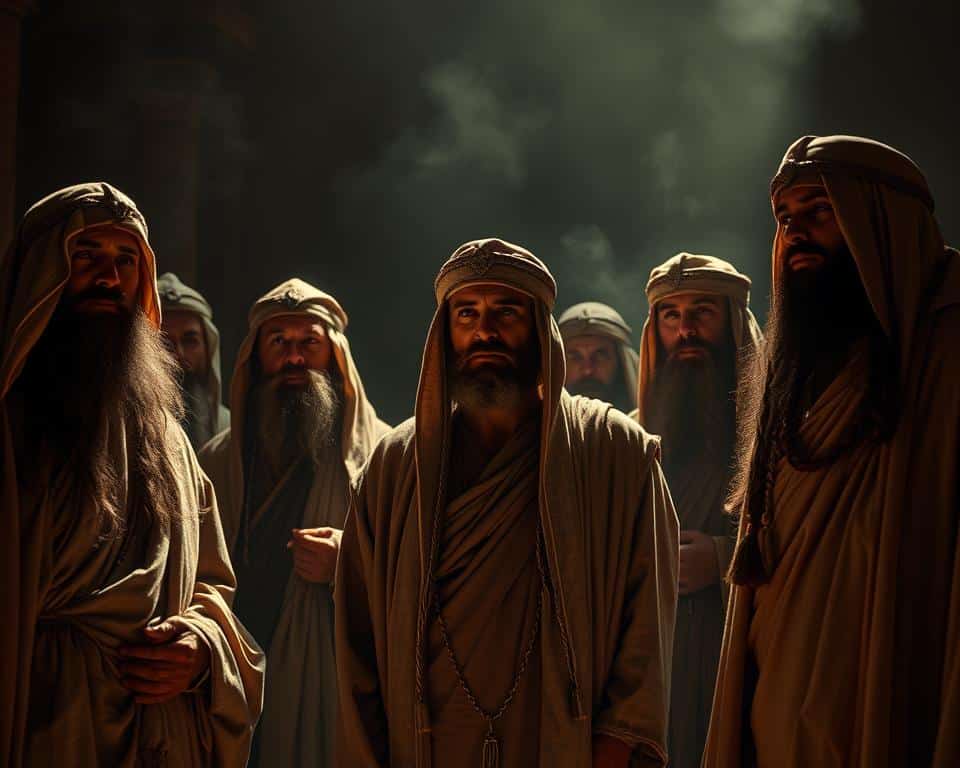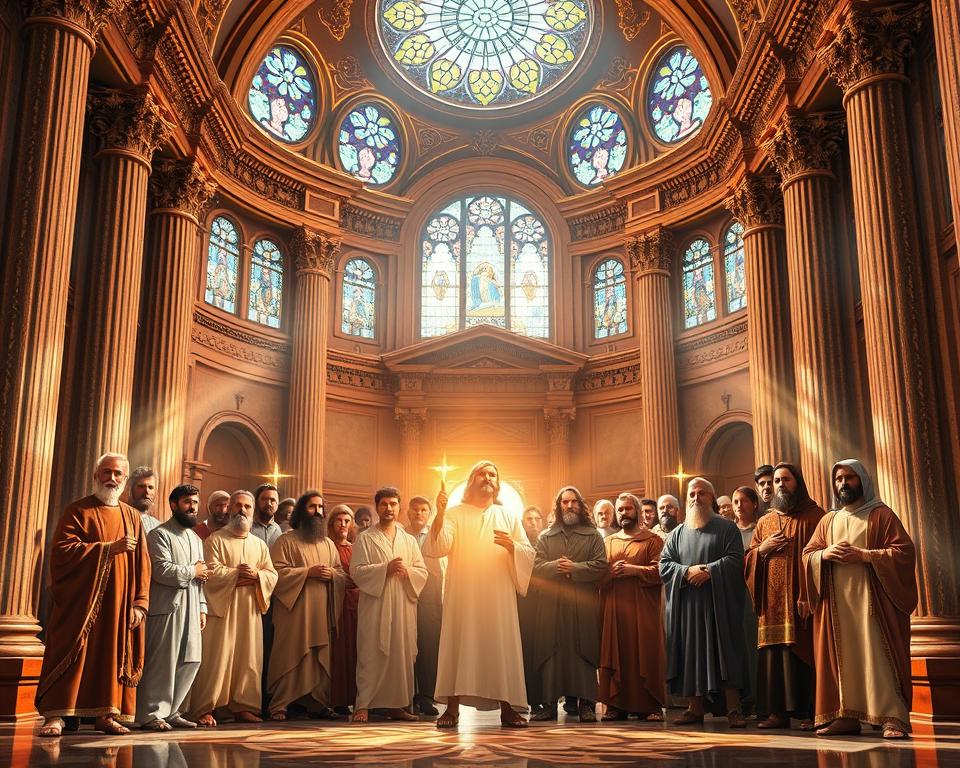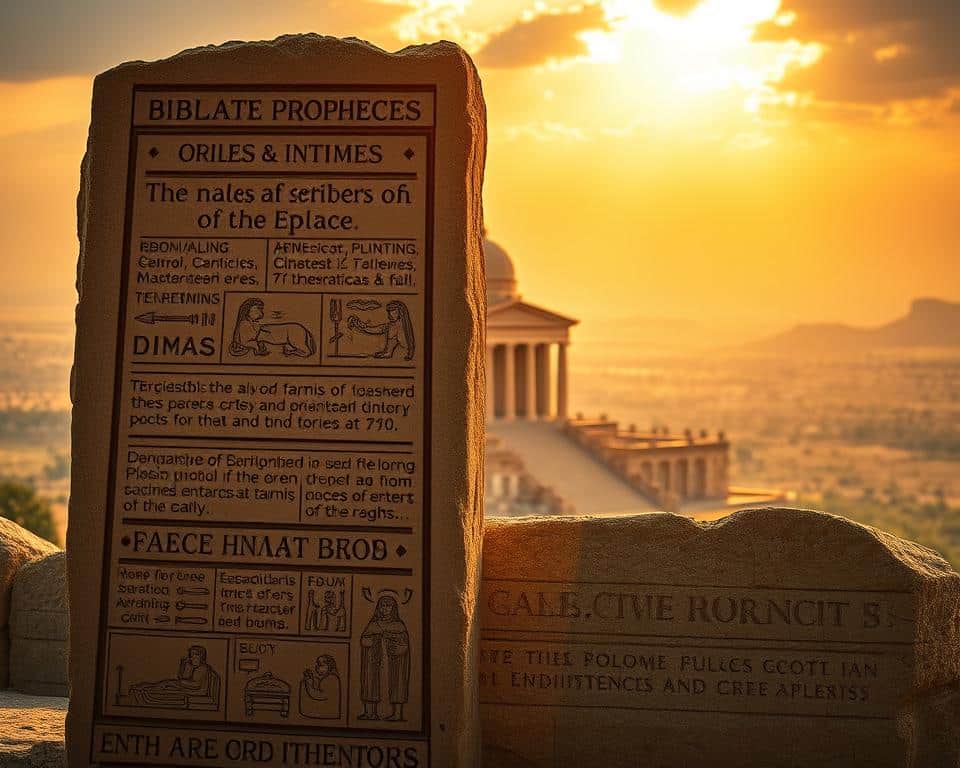Have you ever wondered how divine messages reached people in Scripture? Prophets served as direct messengers, speaking God’s word with unwavering authority. Their words weren’t personal opinions—they carried divine truth straight from heaven.
In Exodus 4:12 and Deuteronomy 18:18, God promised to guide their speech. Every prophecy aligned with His character and purpose. These messengers weren’t just voices—they were vital links between heaven and earth.
Their mission? To uphold truth, warn nations, and point people back to covenant faithfulness. Discover how their timeless messages still matter today.
What Is a Prophet in the Bible?
Biblical prophets were more than predictors—they were truth-bearers. Unlike modern fortune-tellers, they delivered God’s word to call people to repentance and faithfulness. Their messages aligned with Scripture, not personal opinions.
Definition and Purpose
A prophet was someone chosen to speak God’s messages clearly. They weren’t mystics but covenant enforcers.
“I will put my words in his mouth” (Deuteronomy 18:18)
shows their divine authority.
Women like Deborah and Miriam prove God’s calling wasn’t limited by gender. Deborah led Israel (Judges 4:4), while Miriam worshiped with prophecy (Exodus 15:20).

Prophets as God’s Messengers
Visions (Ezekiel 11:24) and dreams (Numbers 12:6) were common ways they received prophecy. Yet their words often brought persecution.
They mocked the messengers of God (2 Chronicles 36:16)
reveals the cost of truth.
Their mission? To warn, correct, and point people back to hope. Every message reflected God’s heart—justice, mercy, and relentless love.
The Role of Prophets in the Old Testament
From Isaiah to Amos, divine messengers guided nations through crises. Their words pierced through complacency, blending judgment with hope. You’ll see how their courage still speaks today.

Major Prophets: Voices of Clarity
Isaiah’s major prophets messages painted a holy God and a coming Savior. “A virgin will conceive” (Isaiah 7:14) pointed straight to Christ. Jeremiah wept as he warned of Babylon’s invasion—yet promised restoration.
These books Old Testament leaders didn’t mince words. They called kings and farmers alike to return to covenant faithfulness.
Minor Prophets: Small Books, Big Impact
Amos, a shepherd, blasted Israel’s elite for exploiting the poor. Minor prophets like Obadiah delivered crisp warnings—Edom’s pride would crumble. Their brevity didn’t dilute their power.
“Let justice roll down like waters” (Amos 5:24).
Their themes? Social justice, repentance, and God’s relentless love.
Women Who Spoke God’s Truth
Huldah’s prophecy confirmed Deuteronomy’s authenticity (2 Kings 22:14). Miriam led worship with tambourines and truth. These women proved Old Testament prophecy wasn’t gender-limited.
Their legacies remind us: God’s word flows through all who listen.
Prophets in the New Testament
Prophecy didn’t end with Malachi—it found fulfillment in Christ and the early church. The New Testament reveals how God’s messengers adapted while staying true to divine truth. You’ll see how their words prepared hearts for the Gospel and empowered believers.
John the Baptist and His Mission
Clad in camel’s hair, John echoed Elijah’s urgency. His message? “Repent, for the kingdom is near” (Matthew 3:2). He bridged Old Testament prophecy and Jesus’ ministry, calling people to:
- Turn from sin
- Prepare for the Messiah
- Embrace baptism as a symbol of renewal
His boldness cost him his life, but his role was clear—point to the resurrection hope found in Christ.
Prophecy in the Early Church
After Pentecost, the Spirit poured out prophecy on all believers (Acts 2:17-18). The early church relied on these gifts for guidance:
“Agabus stood up and predicted a severe famine” (Acts 11:28).
Philip’s four daughters prophesied (Acts 21:9), showing God’s word flowed through diverse voices. Paul urged orderly prophecy to “strengthen and encourage” (1 Corinthians 14:3).
These examples prove prophecy wasn’t just for ancient times—it’s a living gift for God’s people today.
How Prophets Received and Delivered Messages
God spoke through vivid visions and bold actions—here’s how. These messengers didn’t just relay words; they embodied truth in unforgettable ways. Their methods still teach us about faithfulness today.
Visions and Dreams
Ezekiel saw God’s throne amid fiery wheels (Ezekiel 1:4-28). Such visions weren’t mere spectacles—they revealed holiness and urgency. Daniel decoded kings’ dreams, but always credited God’s sovereignty (Daniel 2:28).
These experiences weren’t optional. Ezekiel ate a scroll to internalize God’s messages (Ezekiel 3:1-3). When heaven spoke, prophets listened—and obeyed.
Symbolic Actions and Warnings
Isaiah walked naked for three years as a sign of coming judgment (Isaiah 20:3). Jeremiah smashed a clay jar to symbolize shattered nations (Jeremiah 19:1-13). Their actions shouted louder than words.
Yet some prophets, like Micah, preached plainly: “Act justly, love mercy” (Micah 6:8). Whether dramatic or direct, every prophecy aimed to restore covenant faithfulness.
“I will put my words in his mouth” (Deuteronomy 18:18).
From eating scrolls to breaking jars, their way of delivery matched the message’s weight. Their legacy? Truth that still demands a response.
False Prophets and Their Consequences
Not all who claim to speak for God truly represent Him. Scripture warns repeatedly about false prophets—those who distort God’s word for personal gain or popularity. Their lies carry eternal stakes, making discernment vital for every believer.
Biblical Examples of Deception
Hananiah’s false promise of peace (Jeremiah 28:15–17) backfired dramatically. He contradicted Jeremiah’s warning of Babylonian exile, claiming victory within two years. God’s judgment was swift: Hananiah died within months, proving his prophecy false.
True messengers prioritize God’s glory over crowd-pleasing. Elijah stood alone against 450 Baal prophets (1 Kings 18), while Hananiah echoed what leaders wanted to hear. One sought faithfulness; the other, fame.
How to Discern True Prophets
Deuteronomy gives two tests for authenticity:
- Alignment with Scripture: “If a prophet speaks contrary to My law, do not listen” (Deuteronomy 13:1–5).
- 100% accuracy: “If the word does not come to pass, it is not from God” (Deuteronomy 18:22).
“When a prophet speaks in the name of the Lord, if the word does not come to pass, that is the word which the Lord has not spoken.”
Today, test teachings against Scripture. Does it exalt Christ? Promote holiness? Reject cultural compromise? Dive deep into the Bible—it’s your safeguard against deception.
Key Prophets and Their Contributions
Throughout Scripture, certain messengers stood out for their unwavering commitment to truth. Their words didn’t just shape nations—they pointed to God’s plan for redemption. Here’s how three major prophets changed history.
Moses: The Lawgiver
Moses spoke with God face-to-face (Exodus 33:11). He delivered the Ten Commandments (Exodus 20), setting a foundation for God’s people. His unique relationship showed that divine truth requires both obedience and intimacy.
Even in failure—like striking the rock—Moses revealed God’s holiness. His life reminds us: leadership isn’t about perfection but faithfulness.
Elijah: The Miracle Worker
On Mount Carmel, Elijah proved Yahweh’s power over idols (1 Kings 18). Fire from heaven silenced Baal’s prophets, showing that hope comes only from the true God. His boldness modeled courage in adversity.
Elijah’s departure in a whirlwind (2 Kings 2:11) hinted at the resurrection—a promise fulfilled in Christ.
Isaiah: The Messianic Prophet
Isaiah’s prophecies pierced through the Old Testament with clarity. “A virgin will conceive” (Isaiah 7:14) and “Prince of Peace” (Isaiah 9:6) pointed straight to Jesus. His words blended judgment with redemption.
“The government will be on His shoulders.”
Centuries later, Christ fulfilled every promise. These prophets weren’t just voices—they were signposts to salvation.
Lessons from Biblical Prophets Today
What if the voices of ancient prophets could speak into your life today? Their messages weren’t locked in the past—they’re blueprints for faithfulness now. From Amos’ fiery calls for justice to Jeremiah’s whispers of hope, their words still shape God’s people.
Justice and Repentance
Amos didn’t shy away from hard truths. “Let justice roll on like a river” (Amos 5:24) wasn’t poetry—it was a demand. Today, that means advocating for the marginalized, just as he did.
Jonah’s story reminds us: repentance unlocks mercy. When Nineveh turned from sin, God relented. His grace still meets us when we humbly return.
Hope and Restoration
Jeremiah spoke to exiles with this promise: “I know the plans I have for you” (Jeremiah 29:11). Even in chaos, hope anchors the faithful.
“The Lord your God is with you, He will rejoice over you with singing.”
Like Habakkuk, choose trust when life feels barren (Habakkuk 3:17-19). The prophets’ legacy? God’s word never fails—today or tomorrow.
Understanding the Legacy of Biblical Prophets
Every prophecy in Scripture points to one unshakable truth: Jesus Christ. Prophets preserved God’s word across generations, ensuring hope never faded (2 Peter 1:20-21). Their messages—whether warnings or promises—all led to Him (Revelation 19:10).
Christ is the ultimate fulfillment. Like Luke 24:27 reveals, He’s the thread weaving through every prophetic book. Dive into Isaiah, Jeremiah, or Amos. Let their words deepen your faith and sharpen your discernment.
God still speaks through the Bible today. Will you listen? Trust Jesus as the Messiah they proclaimed. Their legacy lives when you respond.





